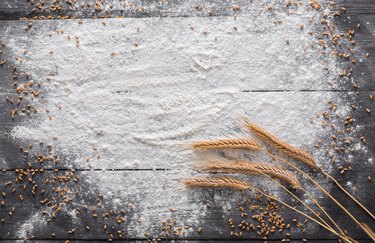
Many people don't associate a food allergy with fever, headache and fatigue. However, a bad reaction to foods can trigger these symptoms and many more.
Food Allergies, Intolerance and Reactions
Video of the Day
If a specific food makes you feel ill, the reaction could be an allergy, an intolerance or some other kind of reaction. Many people label all negative reactions to food as allergies. After all, the end result is the same whether you have an allergy or an intolerance to a certain food: you must avoid the food that triggers your reaction.
Video of the Day
However, the reactions inside the body are different, and lead to varying symptoms. The Mayo Clinic reports that the most common food allergy symptoms are:
- Itching and tingling in the mouth
- Dizziness and fainting
- Itchy skin, associates with hives or eczema
- Abdominal discomfort, including diarrhea and vomiting
- Swelling in the mouth, throat or other parts of the body
- Difficulty breathing, including wheezing and nasal congestion
- Anaphylaxis, which is life threatening
As such, you are not likely to experience a food allergy with fever, headache and fatigue. Instead, such symptoms may be signs of intolerances, other underlying disorders, or contaminated food.
Read More: 10 Facts You Need to Know About Food Allergies
Niacin and Other Headache Triggers
You may have a food intolerance if you have the same negative physical reactions to the same food consistently, in a manner that is not caused by an allergy. Food intolerances generally involve less severe symptoms, and people can often have small amounts of the food in question without trouble. Sometimes, a food intolerance means that certain foods cause headaches.
The Cleveland Clinic reports that 20 percent of people who see doctors for recurring headaches have certain foods that cause these symptoms. Most of the findings in this area are based on self-reporting, which can be flawed. However, patients consistently report that the following foods can trigger headaches:
- Monosodium glutamate
- Aged cheese
- Artificial sweeteners
- Niacin
- Nitrates
- Nuts and seeds
- Chocolate
- Tomato-based products
- Dried fruit
- Pickled foods
Some patients get headaches from eating some foods on the list, but not others. A food and symptom journal can help you and your doctor discover which foods may trigger headaches for you.
Read More: Causes of Waking Up With a Headache
Gluten and Fatigue
Celiac disease, and other reactions to gluten, fall under the broad "food intolerance" definition. Harvard Health Publishing reports that celiac disease is an autoimmune disorder that causes the body to attack gluten as if it were harmful. Celiac disease can cause many symptoms, including:
- Fatigue
- Abdominal pain
- Bloating
- Diarrhea
- Unexplained weight loss
Untreated celiac disease makes it difficult for the body to absorb nutrients. As such, people with the disorder may experience other symptoms related to malnutrition, including joint pain, osteoporosis, infertility and canker sores. The only treatment for celiac disease is a completely gluten-free diet. However, going gluten-free seems to only help people with gluten sensitivity or celiac disease.
Gluten is a protein found in certain grains, including wheat, barley and rye. Going gluten-free involves more than just buying special bread and pasta, however. You can find gluten in spice mixes, sauces and additives in all kinds of foods.
Read More: 9 Foods You Didn't Know Contain Gluten
Consider Contaminated Foods
While you may think you have a food allergy with fever, consider the possibility that food poisoning caused your symptoms. Consuming food or drinks that are contaminated with certain bacteria can cause negative reactions. The Centers for Disease Control and Prevention reports that food poisoning can cause:
- Fever
- Nausea and vomiting
- Diarrhea
- Abdominal cramping
Unlike food allergy symptoms, signs of food poisoning may not show up until hours after you eat the offending food. It's important to seek medical attention if your symptoms become severe. For example, you need to see a doctor if your fever goes above 102 degrees, if you cannot keep liquids down or if you find blood in your stools.
Several different types of food can cause food poisoning, including:
- Raw dairy products
- Shellfish
- Sprouts
- Flour
- Improperly-cooked meat
- Unwashed fruit
Be sure to prepare and cook all your food properly to avoid food poisoning. If you know you did this, and you continue to react negatively to a specific food, talk to your doctor about the possibility of a food intolerance or allergy.
Was this article helpful?
150 Characters Max
0/150
Thank you for sharing!
Thank you for your feedback!